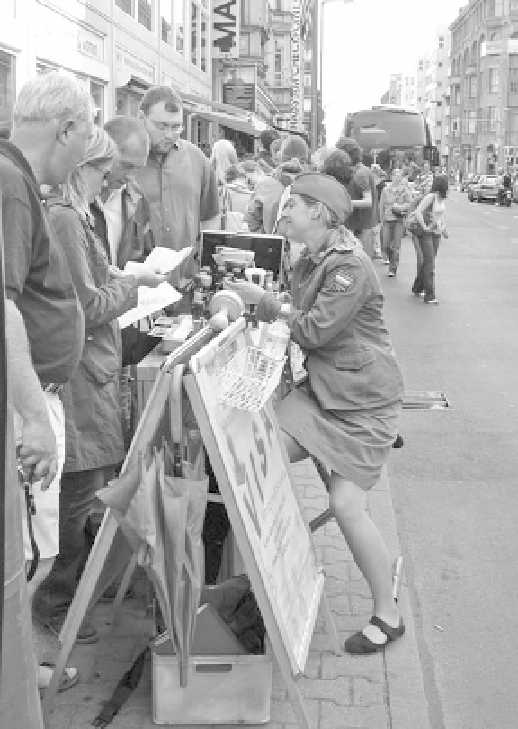Travel Reference
In-Depth Information
Fig. 2.11.
Ostalgia experiences: once
upon a time Checkpoint Charlie; false
GDR visa.
children, Heidiland offers the traditional activi-
ties found throughout the Alps: trekking, skiing,
and so forth, but with the added value of the
Heidi myth.
And of course, in the little village of Maienfeld,
tourists can visit 'Heidi village' and 'Heidi's
House - the Original'. In effect, Heidi's House
lies at the heart of the concept of Heidiland,
since it is the focal point of a mythical world that
has disappeared and for which we can only feel
a sense of longing, of nostalgia. Heidi's House
is a concrete symbol of the home we have lost,
reconstructed to be able to offer it to anyone
who feels nostalgia, to anyone who wants to
experience it. The Heididorf website
(www.
heidiland.com)
explains that 'The authentic
house of Heidi has been turned into a museum
that reveals how Heidi lived in these moun-
tains over 100 years ago': which of course
glosses over the fact that Heidi's house is a
fi ctional
place; and yet 'Heidi's House - the
Original' is presented as 'the' mythical home of
Heidi, and as such, as authentic, unique, unre-
peatable and unsubstitutable.
Heidiland and Heididorf give us a typical
example of the way in which tourism can exploit
nostalgia, a sentiment that is individual and yet
nonetheless has strong collective roots, and is
universally present throughout modern societies.
More precisely, the success of Heidiland as a
tourism region has been fuelled by the nostalgia
linked to the disappearance of rural lifestyles, of
ancestral ties to the land and nature, and of the
organic ties that bind individuals and traditional
communities. Because this sense of longing
cannot fi nd an 'authentic' satisfaction - in that,
as we have seen, the mythical home no longer
exists - the market has infi nite possibilities to cre-
ate added value by responding to this unquench-
able, endless desire of modern consumers.
In our case study, the invented 'Heidi's
House - the Original' is a concrete version of

Search WWH ::

Custom Search